Along Came Polly is your usual conventional by-the-numbers romantic comedy that is good for nothing more than a good laugh. As usual, these kinds of movies are reeled out frequently by the studios just to soak up some light money.
As the film opens, Reuben Feffer (Stiller) gets married to the girl of his dreams named Lisa (Messing). But while the two are enjoying their honeymoon, Lisa dumps Reuben for a muscle-bound nudist French scuba instructor (Azaria).
Reuben is heartbroken, but his best friend Sandy (Hoffman) encourages him to move on, get over Lisa and find someone else. At a formal party, he meets Polly Prince (Aniston) who was an old class mate of Reuben's. The two strike up a good friendship, although Reuben wants to take things further than that. But Polly, who's scared of commitment, is reluctant to move to the next level and troubles ensue.
Like I stated before, this is strictly a by-the-numbers affair that isn't a masterpiece by any stretch of the imagination. There are a few good laughs, most of which are toilet oriented. Like most of Ben Stiller's films, his performance is good (although he always does the same type of role) and there are some funny, witty lines that he delivers. That said, the laughs are only occasional and there are very few that are actually memorable. And, like all movies in this vein, there are moments when the fun is over until the very end when things turn out okay. The same old formula is becoming very tiring!
Jennifer Aniston is at her usual standard here. She seemed to resemble her character from Friends in a sense. Philip Seymour Hoffman is actually pretty decent in an unusual change on his usual role. I never would have expected someone of his stature to pop up in a romantic comedy like this.
Along Came Polly was never meant to be anything groundbreaking or any sort of a masterpiece...and it isn't. That said, it isn't terrible either. I enjoyed the movie as it is told well and has some good gags (being from Australia, some of the Aussie gags had me in stitches). Nothing we haven't really seen before, but worth a rental at least.
Worth watching. Nothing special, though.
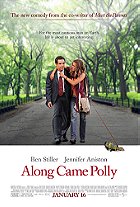 Posted : 17 years, 2 months ago on 22 April 2008 08:21
(A review of Along Came Polly)
Posted : 17 years, 2 months ago on 22 April 2008 08:21
(A review of Along Came Polly) 0 comments, Reply to this entry
0 comments, Reply to this entry
Captivating...
 Posted : 17 years, 2 months ago on 22 April 2008 07:11
(A review of Into the Wild)
Posted : 17 years, 2 months ago on 22 April 2008 07:11
(A review of Into the Wild)Sean Penn's beautiful film Into the Wild is yet another masterpiece of 2007 that divides the blockbuster/action lovers from those who seek magnificent filmmaking.
Into the Wild is a gorgeous production affluent in poignant messages about life. The 140-minute film is exquisitely paced and carried by not only the performances but elegant shots that depict beautiful pictures of nature.
The film is based on a best-selling novel by Jon Krakauer that tells the tragic tale of a young man who escapes the banalities of life, leaves his middle-class family and explores the world. Christopher McCandless (Hirsch) graduates from university with fantastic grades. His marks will open up endless opportunities for jobs and careers for his imminent future. But Chris doesn't want to continue an acquisitive life that is orientated by money and materialistic possessions. Instead he wants to travel to Alaska where he feels nature will provide true happiness free of obligation and relationships. Chris donates most of the remaining money of his college fund to charity, burns the rest and hits the road as a dirty hitchhiker under the alias of Alexander Supertramp with the goal of Alaska in mind.
His excursion introduces him to a procession of people whom he becomes emotionally involved with. These people shape Chris' life and are touched by his vigour and dedication that will lead him to his eventual ambition of reaching the wilderness of Alaska. Chris is an inexperienced bushman but is devoted to his belief of finding contentment in the natural world away from a world that relies on wealth and materialistic belongings.
Into the Wild is powerful, riveting and moving. Sean Penn's direction is fundamentally perfect. He wrote the screenplay and transitioned this script to the big screen. The cinematography was one of the first things that really struck me. The colour palette felt natural; showcasing some landscape scenes that are absolutely beautiful to watch. Be it running water, stunning mountain ranges, animals in their natural habitat or the wind grazing the trees; these are all unique examples of accurately showing the mainstream environment of its location. Even shots that show the mundane city or the typical life of suburbia look graceful thanks to the great cinematography and powerful score. The soft guitar music was frequently utilised and it gives each shot a magical feeling to it. The music suits each and every scene it features in; each note was carefully planned out to suit the shot that it's being used for. This care and dedication to on-screen perfection means that the audience can never be bored.
I was never bored in amidst the fascinating events and the engaging story. Emile Hirsch's performance as Chris/Alex is close to Oscar worthy. I will admit that his character was a selfish human being who brought the tragedies upon himself, but Hirsch plays the role faultlessly. Hal Holbrook was nominated for an Oscar for his minor role in the film. He only appears for little time during the final quarter, but the character is one of the most significant in the film. Hal's performance has a heavy, powerful impact on the audience. He almost had me in tears during his important lines that are vital for the advancement of the story. Jena Malone was a stand out as Chris' sister who also delivers lines of narration throughout the film's duration.
Into the Wild is a remarkable tale that is thoroughly engaging and immensely entertaining. Into the Wild is stunning, gorgeous and memorable. It celebrates the extraordinary, tragic tale of an ambitious man who abandons his money-orientated existence and gives up all possible prospects of becoming highly successful in the pursuit of happiness. Highly recommended.
 0 comments, Reply to this entry
0 comments, Reply to this entry
Spielberg's reputation is well earnt!
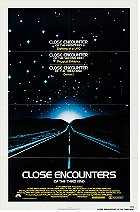 Posted : 17 years, 2 months ago on 22 April 2008 03:23
(A review of Close Encounters of the Third Kind)
Posted : 17 years, 2 months ago on 22 April 2008 03:23
(A review of Close Encounters of the Third Kind)
Close Encounters of the Third Kind is a miraculous piece of science fiction cinema, and is unquestionably one of Spielberg's many groundbreaking masterpieces created during his youth.
The film also marks Spielberg's first invasion film, with two other equally impressive invasion films to follow years later. Before Close Encounters, Spielberg had already made a name for himself thanks to his skilful effort in making Jaws two years previously.
Undisputedly among the best science fiction movies of all time, Close Encounters of the Third Kind follows a young father named Roy Neary (Dreyfuss) who lives a general suburban lifestyle with a family and a mortgage. On one night Roy finds himself out driving in the middle of no-where. While in a state of disorientation, Roy experiences a 'close encounter' with a UFO. He strongly believes in what he saw, and what follows is a personal struggle in addition to a descent into madness.
Like most of Spielberg's movies there are lots of absorbing recurring themes; principally, the theme of a neglectful father. Because of Roy's obsession with the strange occurrences with aliens he neglects his family and begins going insane. This is played to perfection by Richard Dreyfuss. The man can act extremely well; he portrays a very likable man despite the characters flaws created by the screenwriter.
The special effects still look absolutely staggering, with alien spacecrafts that look out of this world! The design is flawless and revolutionary, marking one of the first invasion films not to include the trademark 1950's style flying saucers. The use of lights was especially stunning, and the cinematography by Vilmos Zsigmond is outstanding.
The impressive visuals are accompanied by John Williams' evocative score. The use of choirs during key scenes creates such an exceptional atmosphere and is perfect for use during scenes that showcase such marvellous special effects.
Steven Spielberg, still a young man, put everything he could into this movie. His incredible vision is realised on screen in an inspirational way. The middle section of the movie is tight, but requires patience on the part of the viewers. Because of the fascinating style it's impossible to feel bored.
Of course this invasion film is not concerned with action or the end of the world, but the beautiful bond that mankind can share with creatures from another world. Many criticise the conclusion for the movie, calling it unsatisfying. The ending is perfect and symbolic. I could not think of a better way to finish the already perfect experience.
Close Encounters is a remarkable science fiction film that cannot be missed. Both critics and audiences adored this movie when it was first released, and its original impact still remains. Watch it without hesitation.
 0 comments, Reply to this entry
0 comments, Reply to this entry
One of Spielberg's masterpieces!
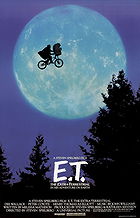 Posted : 17 years, 2 months ago on 22 April 2008 03:19
(A review of E.T. the Extra-Terrestrial)
Posted : 17 years, 2 months ago on 22 April 2008 03:19
(A review of E.T. the Extra-Terrestrial)I don't know if it's possible, by any stretch of the imagination, to find Steven Spielberg's E.T. anything less than a perfect movie. The whole experience completely blew me away, and just the thought of this movie being made almost 30 years ago makes the film seem even more amazing.
The whole movie has not dated one bit. Every time we see that little fat alien it never looks fake - not even for a second. For the whole time he looks incredibly real, without any hint of flaws at all. The whole story is classic, and the whole experience is filled with moments of true nostalgia.
E.T. is the tale of a little ugly-but-loveable alien who comes to Earth with others from his species. But as the government arrives at the scene, the aliens pack up and leave...inadvertently leaving behind one of their own. The story then turns to a young boy named Elliot (Thomas) who lives with his family. In a bad state of mind because of the recent divorce of his parents, Elliot is having trouble coping. But one night his whole life is changed when he finds the little alien in his garden shed. Of course, no-one believes what he saw...until Elliot decides to bring the alien into his home and harbour him from the harsh world that surrounds them. But the government have not called off their search for the little extra terrestrial they know was left behind, and now know where he is hiding.
E.T. is a film filled with incredible power. With each new film Spielberg sets the bar even higher with his new state-of-the-art special effects and innovative concepts. Spielberg conceived the whole concept himself, and this only heightens my respect for the man. His directing is always done to perfection. He knows how each shot will play out, and must reach perfection before the film's completion.
And John Williams' score...was absolutely flawless. The music gave me goosebumps because it was so powerful, and it still gives me goosebumps every time I watch it. The power of the movie never wears off no matter how many times you've seen it. If anything, it's more powerful with each new screening. The score is triumphant, inspirational and poignant.
The whole sound design was amazing. The little alien sounded so oblivious and innocent, and his tone of voice is so gorgeous not to mention adorable.
Performances are loaded with power. Young Henry Thomas, star of the show, carries the film incredibly. He's a young actor, but he can't be flawed in terms of acting skills. He had me in tears. It was interesting seeing young Drew Barrymore in the cast. She's still a young girl and she looks so delightful.
Almost 30 years on, E.T. is a film that still captures the hearts of contemporary audiences. It stands the test of time and is a true classic. I was in tears for the whole movie, and you will be too - in terms of both sadness and the poignancy of the experience. Do not miss this one or you will be passing up one of the greatest films of all time.
 0 comments, Reply to this entry
0 comments, Reply to this entry
A classic. Not to be missed.
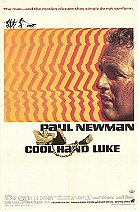 Posted : 17 years, 2 months ago on 22 April 2008 03:14
(A review of Cool Hand Luke)
Posted : 17 years, 2 months ago on 22 April 2008 03:14
(A review of Cool Hand Luke)During the opening credits we are introduced to a man named Luke (Newman); he's drunk and cutting the heads off parking meters. His crime isn't seen with sympathy and he is sentenced to two years on the chain gang in a prison camp. His treatment is inhumane as the prisoners are forced to work long hours under the boiling hot sun performing maintenance duties on roads - they re-tar the surface, shovel out clogged ditches, etc. And at night the slightest contravention leads to a night in 'the box'; that is, a small shed where a prisoner will be in solitary confinement. Luke approaches his punishment with a smile on his face. His spirit can't be broken no matter how harsh the conditions are. He's silent most of the time and he's not a trouble-maker. His nickname amongst the prisoners becomes 'Cool Hand Luke' to match his cool personality.
The prison warden (Martin) is not pleased with Luke's attitude and aims to break his spirit. This conflict becomes the heart of the film.
Cool Hand Luke is a memorable movie that is a study of the unbreakable human spirit in the face of oppression. It's not a prison movie, but a simple tale about failure to conform in a world that requires it.
Although a dialogue-driven drama the film has a great message and is filled with memorable sequences. The film is long but it's not overlong. Each scene has a purpose in relation to the advancement of the story; each scene further develops the character of Luke and his indestructible spirit. By developing the character so effectively we can easily empathise with him during his dilemma later on into the movie.
Paul Newman delivers an unforgettable performance as Luke. Many may regard this as his best performance. He was nominated for an Oscar and his portrayal is full of heart, but it's still up for debate as to whether it's his best performance. There are many familiar faces present in this production. George Kennedy achieves a highly memorable performance. His character recognises that Luke is a man who can't be beaten. Also look out for a very young Dennis Hopper.
The music by Lalo Schifrin emphasizes the drudgery of working in a chain gang. The music also underlines the heart and spirit that is a recurring theme in the movie. The soft guitar music is especially effective in creating this type of atmosphere.
Cool Hand Luke is a great film that is a classic in every sense of the word. Its great messages alone make the film worth watching. A must for film buffs.
 0 comments, Reply to this entry
0 comments, Reply to this entry
A masterpiece...
 Posted : 17 years, 2 months ago on 22 April 2008 03:11
(A review of Stranger Than Fiction)
Posted : 17 years, 2 months ago on 22 April 2008 03:11
(A review of Stranger Than Fiction)Stranger Than Fiction is a film that completely blew me away. Still minutes after concluding my screening I have tears wetting my eyes, goose-bumps covering my body and I am still trying to figure out what I have just experienced.
Before watching this movie I had only glanced at the film's theatrical poster and thus I had no clue as to the plot of the movie. I had no expectations at all and began watching the movie with absolutely no ideas what to expect. In all honesty I couldn't shake off the feeling that it was going to be another dumb Will Ferrell comedy during which he overacts to get some laughs.
But Stranger Than Fiction is none of that. Instead of a no-brainer comedy we are presented with a masterpiece; a heart-warming, touching comedy/drama that is pretty much unbeatable. If you're expecting another Anchorman or Talladega Nights then I suggest you go rent something else. But if you can look past Ferrell's type-cast performance and instead clear your head of all expectations then you will see what a genuinely outstanding film this truly is.
Stranger Than Fiction is filled with originality, fascinating characters and unpredictable twists. Not to mention the film is groundbreaking, innovative, thought-provoking and captivating. I doubt we will see any films of this stature for a very long time to come.
While watching the movie I enjoyed it a whole lot more without any conception of the plot of the movie. And because of this, I must recommend experiencing the movie without any pre-gained knowledge of the plot. I will just tell you that the film is the story of an IRS agent named Harold Crick (Ferrell) whose organised lifestyle is suddenly interrupted.
Stranger Than Fiction is an extraordinary tale that is engaging and enthralling from start to finish.
The first thing that I noticed was the way in which it was created; there's bright scenery, appealing actors, realistic setting and some catchy music to accompany this. The establishing few shots were enough to keep my attention throughout the whole movie.
Will Ferrell is a man I respect because of his overzealous comedy roles. Ferrell is outstanding in a drama such as this. The man is focused 100% and never breaks his concentration. He's deadpan, dedicated, and charming. Ferrell also had me in tears towards the end because of the poignancy of his performance and the way we could actually sympathise with him. Dustin Hoffman is another person one would hardly expect to find in a film such as this. But he is absolutely superb and lets his character live. Emma Thompson has never been like this before, and she will probably never be this good ever again. She seems concentrated on getting her character perfected. The supporting players are a very weird bunch of big names including Maggie Gyllenhaal and Queen Latifah.
Marc Foster was successfully able to set the atmosphere of this movie within the first five seconds. From that point on I couldn't take my eyes away from the screen. And of course Foster's direction was supported by the great music. I loved the music used in this film as it is catchy and it triggers your imagination.
Stranger Than Fiction is a lot better than I originally thought it would end up to be. The film is a masterpiece - pure and simple. I loved it and found it to be one of my favourite movies of 2006. Not to be missed.
 0 comments, Reply to this entry
0 comments, Reply to this entry
Oliver Stone's masterpiece...
 Posted : 17 years, 2 months ago on 22 April 2008 03:08
(A review of JFK)
Posted : 17 years, 2 months ago on 22 April 2008 03:08
(A review of JFK)
JFK is an astonishing, riveting achievement in filmmaking and marks Oliver Stone's best movie to date. Stone has crafted a masterpiece, and although the film is controversial and always will be due to the subject matter (not to mention those who believe something different will hate the film in favour of their beliefs) the film has been approached exceptionally!
There have been many conspiracy theories in relation to the John F. Kennedy assassination, and all aspects and theories are approached by Oliver Stone in great detail and using all available evidence at his disposal.
The film is the story of New Orleans District Attorney Jim Garrison (Costner) who is the only man to date to take someone to court in relation to the JFK assassination. He takes it upon himself to open up a detailed investigation and finally crack open the conspiracy in relation to one of the worst tragedies during the 20th Century.
In creating such a masterpiece, Stone has also put together an unbeatable cast lead by Kevin Costner who delivers a flawless performance.
Stone's films are always going to be controversial, and many people believe that he tried to shove a viewpoint down out throats and make us believe what he wants us to. But this is only narrow-minded people, as Stone was only outlining the inconsistencies that question the official line of Lee Harvey Oswald being the lone gunman. Until the government finally release the truth, we will never know how accurate the theories outlined here actually are.
Yes, the film is three hours long and many people lose interest, but the film is so well told and above all engaging that I was never bored. When the drama makes it to the courtroom for the final 40 minutes, I had my eyes glued to the screen as we are presented the facts in ways that we cannot dispute, and Costner's final monologue was Oscar-worthy.
On top of this, there are so many other qualities, like providing us with archive footage integrated into the dramatisations that are occurring. That Oscar for film editing was much deserved.
Love it or hate it, I leave it up to you. But if you dislike the movie due to its viewpoints that may question your beliefs; your narrow-mindedness shames our race. It's that simple. And if you don't wish to watch the film due to its three hour running time (God knows I didn't), I suggest that you cut out your stupidity and spend a few hours acquainting yourself with one of the most riveting, astonishing films ever made.
I never had much of an interest in investigating the truth behind the assassination of such a fine man that was JFK, but when I viewed this movie I now feel advantaged to have been presented with such facts, but infuriated that the government have never issued the truth that they so obviously hold. It also reminded me that the democracy we live in disadvantages us in terms of not being presented with vital information that we deserve to be given. And if Oliver Stone was able to trigger such thoughts in my mind, he has done his job correctly.
 0 comments, Reply to this entry
0 comments, Reply to this entry
Shyamalan's brilliant debut thriller!
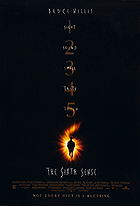 Posted : 17 years, 2 months ago on 22 April 2008 03:00
(A review of The Sixth Sense)
Posted : 17 years, 2 months ago on 22 April 2008 03:00
(A review of The Sixth Sense)In this chilling psychological thriller, Bruce Willis is disheartened child psychologist Malcolm Crowe. After making a mistake with a patient, Crowe later discovers that he failed to help him. Several months later, Crowe learns of a young boy whose circumstances are similar to those of the ex-patient he failed to help. Hoping for redemption, Crowe visits eight-year-old Cole Sear (Osment) who claims he is visited by ghosts, and can "see dead people".
The Sixth Sense received acclaim from critics and audiences alike, and rightfully so. Not since Alfred Hitchcock's Psycho have audiences refused to give away the ending of a movie. The twist...is absolutely mind-blowing.
Shyamalan crafted the movie amazingly, and as a result upon our second viewing we can pick up clues that we missed the first time around. Aside from that, the film is incredibly intelligent and absolutely terrifying at times.
Unlike most thrillers, Shyamalan relies on psychology and our own imagination to scare us rather than using extensive gore. There are plenty of disturbing images throughout the movie as well.
Bruce Willis was absolutely exceptional in the lead role! Haley Joel Osment was nominated for an Oscar for his portrayal of the troubled young boy. He is extremely chilling at times, and some of his lines send chills down your spine. Toni Collette was also nominated for an Oscar, and rightfully so.
The Sixth Sense could be the best thriller film ever made. The film is brilliant. Pure and simple. Shyamalan's exceptional filmmaking techniques create some haunting moments and memorable creepy images that will still leave you terrified after the credits commence rolling. If you have not seen this movie then you have no idea what you're missing out on. It will blow you away. Watch out for a cameo appearance by director Shyamalan.
 0 comments, Reply to this entry
0 comments, Reply to this entry
Coen Brothers pull off another winner!
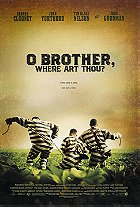 Posted : 17 years, 2 months ago on 22 April 2008 01:52
(A review of O Brother, Where Art Thou?)
Posted : 17 years, 2 months ago on 22 April 2008 01:52
(A review of O Brother, Where Art Thou?)O Brother, Where Art Thou? is basically a successful attempt by the Coen Brothers to resettle the story of Homer's epic poem 'The Odyssey' into 1930s American society. The film begins with Ulysses Everett McGill (Clooney), Pete Hogwallop (Turturro), and Delmar O'Donnel (Nelson) escaping from a chain gang that is situated out in the middle of nowhere. McGill told his fellow escapees that he has hidden a large stash of money from one of his previous criminal exploits. But they have limited time to get to it because its resting place is in a valley which will be flooded fairly soon to make a new dam.
Many things happen over the course of the movie; the three making daring escapes, meeting interesting people and even striking fame as a highly popular band under the name of The Soggy Bottom Boys. What makes O Brother, Where Art Thou? so enjoyable is that it's never boring in amongst the significant events that keep occurring. On top of this the laughs are top notch. The dialogue is very funny at times and made better with the dynamic cast.
George Clooney was a delight as always. He's not charming or sophisticated like he usually is, but instead a man with a Southern accent who is dirty and on the run. Clooney pulls this off very well. Within the first 5 minutes I had already forgotten it was Clooney in the role. If an actor can trigger this feeling then you know that they did their job correctly. Jon Turtorro and Tim Blake Nelson are clumsy and amusing companions for Clooney throughout the course of the unusual adventure that presents itself during the film.
The supporting cast all establish their accents distinctively and give it everything they have. The Coen Brothers are always very skilled in establishing a very unique atmosphere. In this case the classy visuals mixed with a wonderful screenplay are what create such a great atmosphere. The locations and sets in particular felt very authentic.
On top of this the film is extremely weird at times; boasting such extraordinary things like singing female water nymphs, as well as a singing choir of Klu Klux Klan members. All this out-of-the-ordinary material is only something you'll find in a film by Joel and Ethan Coen. On top of this you have a score that is hard to beat. It's full of energy and is very catchy at times.
My attention was never thrown in amidst the witty dialogue, great visuals and groovy soundtrack. O Brother, Where Art Thou? is a prize-winning mix of comedy, musical, drama and adventure that you won't want to miss. I can't stress this enough; I enjoyed this film a lot more than I thought I would. This is proof that with the right story and the right script, a film can be brilliant and funny without being the next The Godfather. Underneath the surface the film is absurd, weird, moody and atmospheric but distinctive, one-of-a-kind and intrinsically great entertainment!
 0 comments, Reply to this entry
0 comments, Reply to this entry
One of the best 1980s teen flicks!
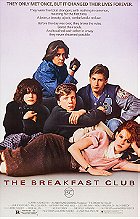 Posted : 17 years, 2 months ago on 22 April 2008 01:25
(A review of The Breakfast Club)
Posted : 17 years, 2 months ago on 22 April 2008 01:25
(A review of The Breakfast Club)During the decade of the 80s John Hughes certainly had his share of classic teen flicks. Among some of his classic was Ferris Bueller's Day Off, Sixteen Candles and of course The Breakfast Club. With The Breakfast Club, writer/director Hughes created an essential 1980s teen film.
And what is so great about this teen film? First of all, the characters are some that we can easily relate to. The film is over 20 years old but the teenage stereotypes haven't changed. Hughes captures the complex lives of teenagers in a realistic way. Also evident is the fact that almost everybody in high school carries a label. There's the geek, the jock, the princess, etc. Another aspect that any 80s movie requires is the fantastic soundtrack. The Breakfast Club features some essentially 80's music; including the very famous title song by Simple Minds.
For various misdemeanours, five high school students with absolutely nothing in common are forced to endure a full day of detention on a Saturday (a ghastly thought) under the watchful eye of the school's Principal Mr. Vernon (Gleason). When the day starts at 7am everyone around the room don't know each other and have nothing to say to each other. But by 4pm the five troublemakers strike up a close bond. As the five begin talking they realise that they have more in common that originally thought. After the heavy insults flying around the room and the feel of mutual hatred, they slowly open up to each other and it's revealed that they are all much deeper and more complex than their initial label might suggest.
The Breakfast Club is a character study that begins as nothing more than a hilarious riot. But more into the second half the style shifts to more of a meaningful, deep drama filled with moments of truth and deception.
The cast is full of wonderful talent. Judd Nelson was my favourite character here as the criminal and deadbeat who doesn't care if he scores himself extra detention. And of course Paul Gleason displays a great array of talent as the stressed principal.
On the surface many would dismiss The Breakfast Club as just a simple comedy. On that note the film is recurrently hilarious. The witty dialogue was especially great at times (despite loads of profanity). But the film is something a lot more than a comedy. It's one of the greatest teen films to be released during the 1980s; offering an incisive plot and a thoughtful set of characters. In its 90-minute running time the film embodies the very essence of the lives of teenagers that is realistic and poignant at times. This is definitely one of John Hughes best efforts.
 0 comments, Reply to this entry
0 comments, Reply to this entry
 Login
Login
 Home
Home 183 Lists
183 Lists 1674 Reviews
1674 Reviews Collections
Collections